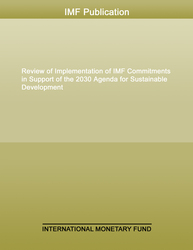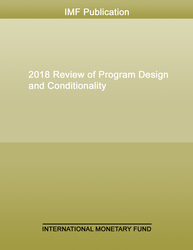
The Medium-Term Debt Management Strategy: An Assessment of Recent Capacity Building
The Medium-Term Debt Management Strategy: An Assessment of Recent Capacity Building
READ MORE...
Volume/Issue:
Volume 2017
Issue 044
Publication date:
ISBN:
Add to Cart by clicking price of the language and format you'd like to purchase
Available Languages and Formats
Topics covered in this book
This title contains information about the following subjects.
Click on a subject if you would like to see other titles with the same subjects.
Exports and Imports , Public Finance , PP , strategy , assessment of Recent Capacity Building , assessment , medium-term debt management strategy , annex , MTDS framework , debt management capacity , Government debt management , Debt management , Medium-term debt strategy , Debt sustainability analysis , Global
Summary
This report to the Boards of the International Monetary Fund (IMF) and the World Bank (WB) is the third in a series regarding the evolution of the Medium-Term Debt Management Strategy (MTDS) framework and the associated capacity building efforts. In 2007 the two Boards endorsed the development of the MTDS and ancillary tools, and mandated a program of technical assistance to help countries build capacity in this area. This endorsement and mandate reflect a recognition that sound debt management is critical both to macroeconomic stability and to the development and functioning of the financial sector. The IMF and the WB have collaborated to deliver a large volume of MTDS-based technical assistance to numerous, diverse countries, with a focus on middle- and lower-income countries. Donors have recognized the importance of this work and have been generous in their support. The assistance has taken many forms, including country visits by staff and experts, the delivery of regional training events, and the organization of forums. As documented here, modes of delivery have evolved, with greater emphasis on tailoring to country circumstances, ownership, and coordination within and across agencies in the recipient countries. The report and accompanying annexes describe how capacity building on MTDS has been adapted to keep abreast of country needs. An increasing number of countries have market access (such as through the issuance of Eurobonds or local currency bonds), and face the potential realization of contingent claims, which requires that the MTDS framework consider additional risk factors; more diverse scenarios and market risk metrics; and a wider range of strategies. In many countries, effective capacity building in MTDS was complemented by efforts to strengthen institutions and governance arrangements; debt recording; and government cash management. Linkages with the formulation of annual borrowing plans (ABP) and debt sustainability analysis (DSA) have been strengthened, but more work is needed. Providing a sustained stream of support, rather than one-off missions, often produced better results. Country ownership, often reflected in commitments under IMF- or WB-supported programs, has proven critical to the sustained enhancement of debt management capacity. The value and effectiveness of these capacity building efforts are documented in the report using qualitative and quantitative metrics. The responses from national authorities to a questionnaire on their experience with MTDS technical assistance and the evolution of various quantitative indicators suggest that there were benefits and these were generally sustained. In particular, the majority of countries that had received technical assistance indicated that it helped them to introduce a structured and coherent approach to designing a debt management strategy (DMS) and raise awareness of risks among senior officials and broader stakeholders. Countries also appreciated advice on institutional and governance reforms and integrating debt management into macroeconomic policy formulation and implementation. The observations are supported by case studies detailing how technical assistance was successfully tailored to country needs. It is shown that many recipient countries are now better able to integrate debt management into overall economic policy formulation and adapt their debt management strategies to changing countries’ circumstances. For some, risk exposure indicators have improved even as debt levels have increased. Looking forward, the report suggests that the MTDS framework and modes of delivery should continue to be updated and refined, while maintaining core functions. Some countries will need more sophisticated techniques both to analyze cost-risk trade-offs and to implement their chosen strategy. Others are still in the process of building a solid foundation for debt management. In addition to hands-on trainings, greater use of on-line learning may further enhance effectiveness and efficiency. Building institutional capacity in debt management is a long-term endeavor, often times requiring a more “programmatic” approach, and sustained client ownership. Such an approach would involve diagnosis followed by an actionable reform plan supported by tailored technical assistance. The Boards are asked for their views on priorities in a strategy for future development of capacity building in this area, and how best to ensure that improvements in debt management are sustained.
Copyright © 2010 - 2026
Powered by:
AIDC



